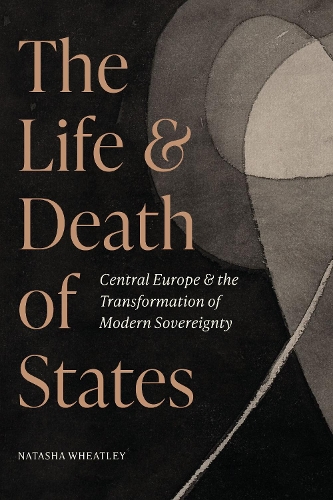
The Life and Death of States: Central Europe and the Transformation of Modern Sovereignty
(Paperback)
Available Formats
Publishing Details
The Life and Death of States: Central Europe and the Transformation of Modern Sovereignty
By (Author) Natasha Wheatley
Princeton University Press
Princeton University Press
11th March 2026
United States
Classifications
Tertiary Education
Non Fiction
Political science and theory
341.26
Physical Properties
Paperback
424
Width 156mm, Height 235mm
Description
An intellectual history of sovereignty that reveals how the Habsburg Empire became a crucible for our contemporary world order.
Sprawled across the heartlands of Europe, the Habsburg Empire resisted all the standard theories of singular sovereignty. The 1848 revolutions sparked decades of heady constitutional experimentation that pushed the very concept of 'the state' to its limits. This intricate multinational polity became a hothouse for public law and legal philosophy and spawned ideas that still shape our understanding of the sovereign state today. The Life and Death of States traces the history of sovereignty over one hundred tumultuous years, explaining how a regime of nation-states theoretically equal under international law emerged from the ashes of a dynastic empire.
Natasha Wheatley shows how a new sort of experimentation began when the First World War brought the Habsburg Empire crashing down: the making of new states. Habsburg lands then became a laboratory for postimperial sovereignty and a new international order, and the results would echo through global debates about decolonisation for decades to come. Wheatley explores how the Central European experience opens a unique perspective on a pivotal legal fiction - the supposed juridical immortality of states.
A sweeping work of intellectual history, The Life and Death of States offers a penetrating and original analysis of the relationship between sovereignty and time, illustrating how the many deaths and precarious lives of the region's states expose the tension between the law's need for continuity and history's volatility.
Reviews
"Winner of the Felicia Krishna Hensel Book Award, International Studies Association"
"A New Statesman Book of the Year"
"Honorable Mention for the Robert L Jervis and Paul W Schroeder Best Book Award, International History and Politics Section of the American Political Science Association"
"Honorable Mention for the Morris D. Forkosch Book Prize, Journal of the History of Ideas"
"Shortlisted for the Laura Shannon Prize, Nanovic Institute for European Studies"
"Path-breaking and field-defining. . . . It is a testament to Wheatley that she catalogues and engages with the many directions the theorization of sovereignty took in the waning days of the Austro-Hungarian empire and its immediate aftermath. Reconstructing this rich intellectual world, she pierces the sovereign states static and immutable image in order to reveal the remarkable political fluidity and theoretical ingenuity involved in its construction."---Adom Getachew, H-Diplo
"A richly rewarding book. . . . Wheatley gracefully unpacks the complicated constitutional issues faced by inhabitants of the Habsburg monarchy." * History Today *
"A really fascinating read."---Justin Kempf, Democracy Paradox
"A valuable contribution to the extensive, and growing, historiography concerning the origins of the modern state. While others have concentrated on non-Western or Western European countries to reach their conclusions about the evolution of modern politics, Wheatleys case study breaks new ground in its analysis of an especially difficult case, the Austrian Empire after the Austro-Hungarian Compromise of 1867." * Choice *
"Its rare to read a work of history that is not only full of facts and stories and brimming with ideas, but also instils in the reader a strong desire for more of all three while setting off a series of ultrabright flares that light up whole landscapes of thought and experience in wide, overlapping circles. Natasha Wheatleys The Life & Death of States does all of that."---Holly Case, H-Diplo
"Monumental. . . . Wheatleys narrative recovers a world where international law was not a dead letter but a blueprint for a multinational and pluralistic world."---Yosef Malka, BR!NK
"[A]n impressive and extremely ambitious narrative of the constitutional vicissitudes of a post-1848 Habsburg Empire."---Carl Landauer, Journal of the History of International Law
"[The Life and Death of States] combines several aspects excellently, including primary source analysis and the reinterpretation of secondary sources, legal debates and political disputes. . . . Wheatleys insightful underlining of the importance of socio-political crises for debates on the ontology and epistemology of statehood is a powerful reminder of the historically specific origins of the modern international order of states are in fact quite recent."---Lauri von Pfaler, International Affairs
"Brilliant"---Quinn Slobodian, H-Diplo
"The Life and Death of States is a dazzling history of the end of the Austro-Hungarian empire and the creation of the modern state system, and an extraordinary combination of legal history, philosophy, and much more. . . . [R]ichly rewarding and deeply thought-provoking."---Stephen M. Walt, Foreign Policy
"Wheatley masterfully and lucidly guides the reader through a convoluted but consequential run of constitutional writs and debates (as well as their elaborate historiography); makes sense of the struggles over rights the empire generated; confronts some of the more outr bubbles of legal thought; and shows in well-curated and deeply researched detail how the complexities of the empire generated not only a path-breaking legal jurisprudence in abstract terms but also a more realistic appreciation of the world of sovereign states than the notion of the unitary state as the paragon of sovereignty could offer. All this is accomplished with reflexive candor and a dose of black humor that is a delight and, above all, entirely suited to it subject."---Micahel Geyer, Journal of Modern History
Author Bio
Natasha Wheatley is assistant professor of history at Princeton University. She is the coeditor of Remaking Central Europe: The League of Nations and the Former Habsburg Lands and Power and Time: Temporalities in Conflict and the Making of History. Her writing has appeared in Past & Present and the London Review of Books.
